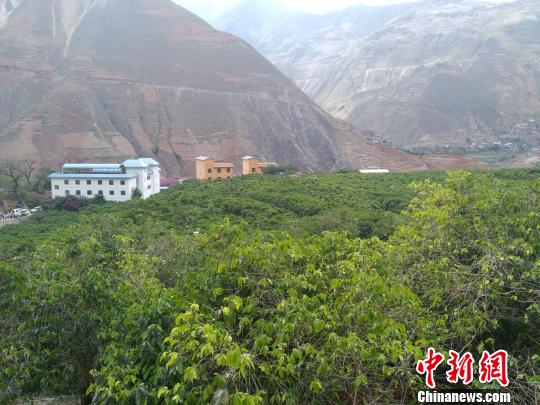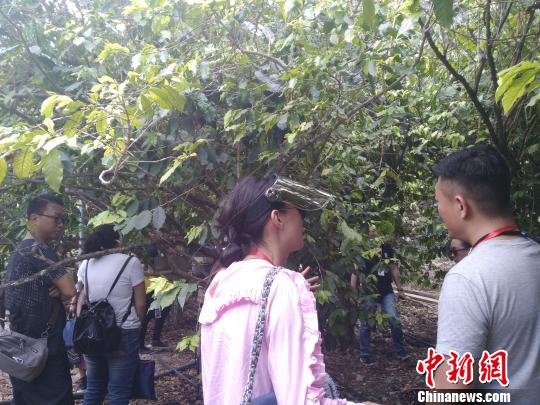Experts and scholars from five countries in Yunnan Binchuan discuss the new development of century-old coffee
For professional baristas, please follow the coffee workshop (Wechat official account cafe_style)
On the 16th, coffee experts and scholars from China, the United States, Ethiopia, India, and France gathered in Zhukula Village, Binchuan, Yunnan Province to hold a "Zhukula Coffee Forum" to discuss the future of century-old coffee-Zhukula Coffee. To help ethnic minorities shake off poverty and become rich and Yunnan coffee "go out".

Chinanews.com, Binchuan, Yunnan, June 16 (Wang Yanlong) on the 16th, coffee experts and scholars from China, the United States, Ethiopia, India and France gathered in Zhukula Village, Binchuan, Yunnan Province to open a "Zhukula Coffee Forum" to discuss the future of century-old coffee-Zhukula Coffee, in order to help ethnic minorities shake off poverty and become rich and Yunnan coffee "go out".
In 1904, Father Tian Deneng (Chinese name) of French Catholicism entered Binchuan to preach. Due to the need of missionary and coffee drinking habits, he introduced coffee seedlings into Zhukula village to plant, so that coffee spread in the village. There are 1134 ancient coffee trees on 13 mu in Zhukula, of which 24 are over 100 years old. The ancient coffee forest in Zhukula Village is the only agricultural form introduced and passed on in situ for more than 100 years in the most barren areas of the dry-hot valley in China and even in the world. it is the most fresh and complete example of the coffee industry in the world.

This forum focuses on the inheritance and protection of the century-old Zhukula coffee forest, coffee culture and intangible cultural heritage, the scientific development of the cultural brand of Zhukula coffee, and the prosperity of Yi farmers in mountainous areas. Ted Green, former president of the Fine Coffee Association of the United States, and Professor Andre Charlier of France believe that coffee cultivation in the world has a long history, and Jukula Coffee provides a good sample for everyone to study the history of coffee communication. In order to go to the world, Yunnan coffee needs to set high standards, train farmers and manufacturers, pay attention to the integration and inheritance of culture, and create an influential brand.
Dong Zuliang, executive director of Yunnan Fine Coffee Association, believes that Zhukula Coffee Forest shows that China began to grow and drink coffee a hundred years ago. At the same time, it is planted in ethnic villages, so that it has the value of national culture, so it should be well developed and protected to promote the inheritance of national coffee culture.
Yunnan is one of the few provinces in China that grow coffee. By the beginning of 2016, the coffee planting area of the province was 1.77 million mu, with a total output of 139000 tons, accounting for more than 99 percent of China's coffee acreage and output, driving farmers in many cities in Yunnan to shake off poverty and become rich.

Qi Fenghua, a villager of Zhukula village, said that Zhukula coffee has been grown in groups in six local villages, the most expensive of which is about 600 yuan per kilogram, and the per capita income of coffee farmers is about 7000 yuan. During the difficult period of getting rid of poverty, coffee gave them another way to get rich.
Yue Lisong, secretary of the Binchuan County CPC Committee, said that Zhu Kula Coffee has become a shining new business card for Binchuan's foreign exchanges, but how to further carry forward the Zhu Kula coffee industry and help people in mountainous areas to increase their income and become rich has become a major issue in front of the national coffee academic community and Binchuan County. This forum will promote the academic prosperity of coffee, give Zhu Kula new momentum of development, achieve results in poverty alleviation in ethnic minority areas, and work together for a well-off society. (end)
Important Notice :
前街咖啡 FrontStreet Coffee has moved to new addredd:
FrontStreet Coffee Address: 315,Donghua East Road,GuangZhou
Tel:020 38364473
- Prev

Results of online bidding for coffee in Guatemala in 2017 announced
For the exchange of professional baristas, please follow the coffee workshop (Wechat official account cafe_style) Guatemala Coffee 2017 online auction results announced that the fine Guatemalan coffee (Cup of Excellence) online auction was held on June 15, 2017, the auction price was won by Acatenango Finca El Parajax Coffee Farm in Chimaltenango province, with a price of US $58 /
- Next

German post-90s come to China to start a Chinese roasted coffee to enter the Chinese market
Professional baristas please follow the coffee workshop (Wechat official account cafe_style) there are several German post-90s, they are from Hanover, Germany, Fabian (Fabian), 26, and Sino-German mixed-race Isabel (Isabel), 23, Fabian's brother Flemming (Fleming) and 23-year-old friend Constain (Constantine). They arrived in 2016.
Related
- The ceremony is full! Starbucks starts to cut the ribbon at a complimentary coffee station?!
- A whole Michelin meal?! Lucky launches the new "Small Butter Apple Crispy Latte"
- Three tips for adjusting espresso on rainy days! Quickly find the right water temperature, powder, and grinding ratio for espresso!
- How much hot water does it take to brew hanging ear coffee? How does it taste best? Can hot water from the water dispenser be used to make ear drip coffee?
- What grade does Jamaica Blue Mountain No. 1 coffee belong to and how to drink it better? What is the highest grade of Blue Mountain coffee for coffee aristocrats?
- What are the flavor characteristics of the world-famous coffee Blue Mountain No. 1 Golden Mantelin? What are the characteristics of deep-roasted bitter coffee?
- Can I make coffee a second time in an Italian hand-brewed mocha pot? Why can't coffee be brewed several times like tea leaves?
- Hand-brewed coffee flows with a knife and a tornado. How to brew it? What is the proportion of grinding water and water temperature divided into?
- What is the difference between Indonesian Sumatra Mantinin coffee and gold Mantinin? How to distinguish between real and fake golden Mantelin coffee?
- What does bypass mean in coffee? Why can hand-brewed coffee and water make it better?

